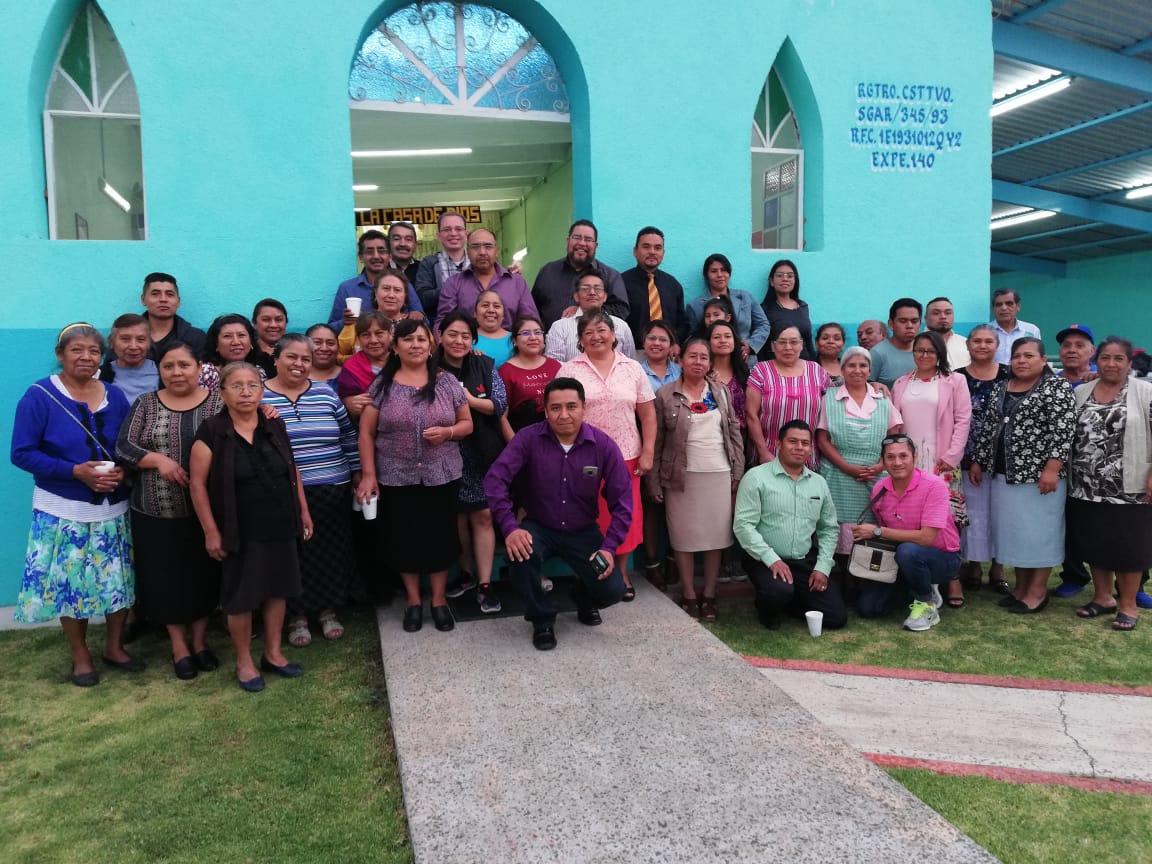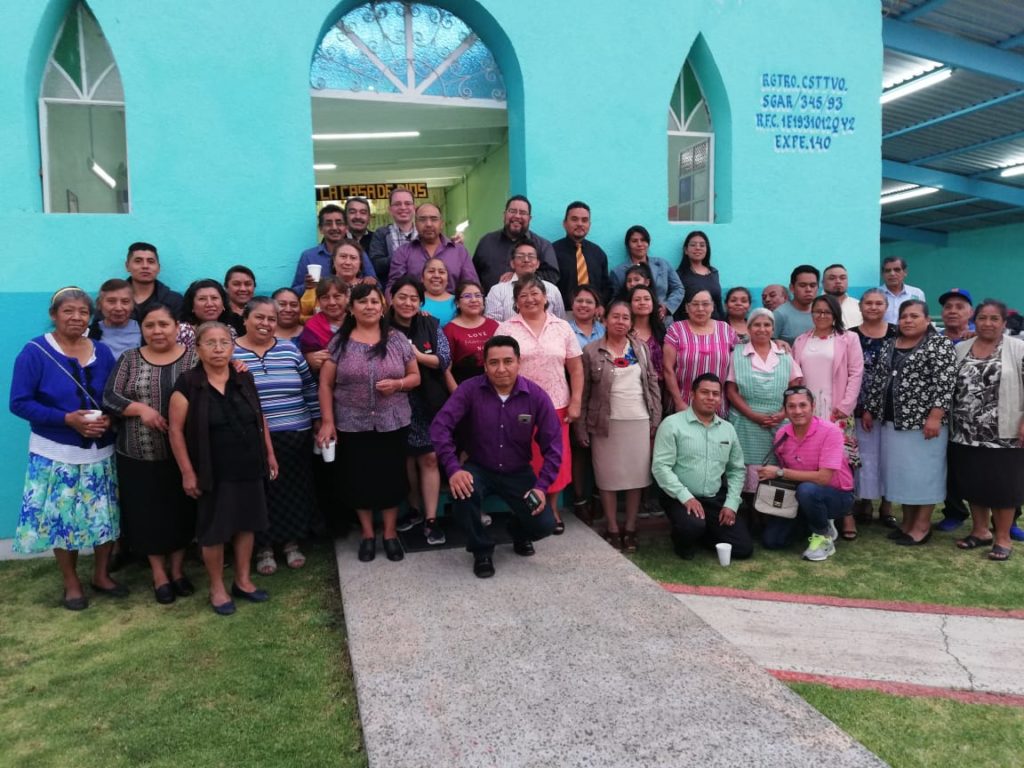Biblical Foundations of Diakonia / Fundamentos Bíblicos de la Diaconía
A church that serves God by serving its community.
Diakonia was a key concept for the first Christian communities, with which they expressed their commitment to dedication and service to God and their neighbor. Although it is a Greek concept used by New Testament writers, it has its roots in different experiences of Israel as a “servant of God.”
 During this first semester of the year 2019, I shared five courses in the Theological Community of Mexico (CTdeM), of which I wish to emphasize the theme of Diakonia. The course on Biblical Fundamentals of the Diaconia turned out to be an interesting and challenging proposal. The students, coming from diverse Christian confessions, hoped to find a methodology to develop diaconal initiatives from their communities of faith. After studying different texts and biblical paradigms for the construction of a conceptual framework of Diakonia, we decided to use the Latin American pastoral method (See, Reflect, Act and Celebrate) to develop diaconal proposals in response to our ecclesial and community contexts.
During this first semester of the year 2019, I shared five courses in the Theological Community of Mexico (CTdeM), of which I wish to emphasize the theme of Diakonia. The course on Biblical Fundamentals of the Diaconia turned out to be an interesting and challenging proposal. The students, coming from diverse Christian confessions, hoped to find a methodology to develop diaconal initiatives from their communities of faith. After studying different texts and biblical paradigms for the construction of a conceptual framework of Diakonia, we decided to use the Latin American pastoral method (See, Reflect, Act and Celebrate) to develop diaconal proposals in response to our ecclesial and community contexts.
Each of the students inquired about the problems that most affect their communities. Dialogal sessions with young people, women, and men helped to define the priority problem, analyzing its causes and consequences. Once the main problem was identified, the students were given the task of reflecting in the light of the Scriptures to discern the will of God, listening with empathy to the people directly affected by the problem. With the analysis of the reality and the biblical-theological reflection, the students defined diaconal actions to contribute to the solution of the problem and celebrate the signs of the Kingdom of God in the life of the communities.
It is important to mention that this year the number of young seminarians interested in preparing for the pastoral ministry increased considerably. Young Methodists, Baptists, Presbyterians, and Pentecostals participated actively in the different groups of students with whom I had the privilege of sharing during this semester. The diaconal projects presented by three of them addressed issues related to gender violence, environmental pollution, and human trafficking.
 Ruth Serrano addressed the problem of human trafficking in the community of Panzacola in the state of Tlaxcala, and the responses that the churches are giving or may face this problem. As part of the diaconal actions presented in their project are: to carry out the pastoral accompaniment to victims of trafficking, develop a prevention campaign with youth groups at ecclesial and community level, coordinate advocacy with other agencies present in the municipality and train children, adolescents and young people on issues of self-care and protection.
Ruth Serrano addressed the problem of human trafficking in the community of Panzacola in the state of Tlaxcala, and the responses that the churches are giving or may face this problem. As part of the diaconal actions presented in their project are: to carry out the pastoral accompaniment to victims of trafficking, develop a prevention campaign with youth groups at ecclesial and community level, coordinate advocacy with other agencies present in the municipality and train children, adolescents and young people on issues of self-care and protection.
For her part, Viridiana García presented a diaconal proposal focused on the problem of environmental deterioration in the municipality of Atlixco in the state of Puebla. Its main objective is to strengthen a culture of environmental care that helps improve the quality of life of families and communities. With actions of prevention and mitigation, it is expected that the churches contribute significantly in the care and good stewardship of God’s creation.
Finally, young Ismael Arroyo worked in his community on the problem of gender violence. Ismael collaborates in the La Joya community located in the state of Morelos. In their community, they identified violence against women as the main problem. Physical, verbal, and psychological abuse is the most frequent according to the community diagnosis. The diaconal actions developed from the church to face the problem include awareness workshops with young people, women, and men, psycho-pastoral care for women victims of violence and association with organizations that have more experience in these issues.
It is gratifying to know that the theological reflection transcends the classrooms of seminars and takes shape in concrete actions of service and love of neighbor. On behalf of the seminaries that make up the CTdeM, I thank Global Ministries for collaborating with the formation of the future pastors, pastors, and leaders of the churches in Mexico, who are already making a difference in their communities.
Una iglesia que sirve a Dios sirviendo a su comunidad.
La diaconía fue un concepto clave para las primeras comunidades cristianas, con el cual expresaron su compromiso de entrega y servicio a Dios y al prójimo. Aunque es un concepto griego utilizado por los escritores neotestamentarios, tiene sus raíces en distintas experiencias de Israel como “siervo de Dios”.
 Durante este primer semestre del año 2019 compartí cinco cursos en la Comunidad Teológica de México (CTdeM), de los cuales deseo enfatizar el tema de la Diaconía. El curso Fundamentos Bíblicos de la Diaconía resultó ser una propuesta interesante y desafiante. Los estudiantes, provenientes de diversas confesiones cristianas, esperaban encontrar una metodología para desarrollar iniciativas diaconales desde sus comunidades de fe. Luego de estudiar diferentes textos y paradigmas bíblicos para la construcción de un marco conceptual de la diaconía, decidimos utilizar el método de la pastoral Latinoamérica (Ver, Reflexionar, Actuar y Celebrar) para desarrollar propuestas diaconales en respuesta a nuestros contextos eclesiales y comunitarios.
Durante este primer semestre del año 2019 compartí cinco cursos en la Comunidad Teológica de México (CTdeM), de los cuales deseo enfatizar el tema de la Diaconía. El curso Fundamentos Bíblicos de la Diaconía resultó ser una propuesta interesante y desafiante. Los estudiantes, provenientes de diversas confesiones cristianas, esperaban encontrar una metodología para desarrollar iniciativas diaconales desde sus comunidades de fe. Luego de estudiar diferentes textos y paradigmas bíblicos para la construcción de un marco conceptual de la diaconía, decidimos utilizar el método de la pastoral Latinoamérica (Ver, Reflexionar, Actuar y Celebrar) para desarrollar propuestas diaconales en respuesta a nuestros contextos eclesiales y comunitarios.
Cada uno de los estudiantes indagó sobre los problemas que más afectan a sus comunidades. Sesiones de dialogo con jóvenes, mujeres y hombres ayudaron a definir el problema prioritario, analizando sus causas y consecuencias. Una vez identificado el problema principal, los estudiantes se dieron a la tarea de reflexionar a la luz de las Escrituras para discernir la voluntad de Dios, escuchando con empatía a las personas afectadas directamente por el problema. Con el análisis de la realidad y la reflexión bíblica-teológica, los estudiantes definieron acciones diaconales para aportar a la solución del problema y celebrar los signos del Reino de Dios en la vida de las comunidades.
Es importante mencionar que este año aumentó considerablemente el numero de seminaristas jóvenes interesados en prepararse para el ministerio pastoral. Jóvenes metodistas, bautistas, presbiterianos y pentecostales participaron activamente en los distintos grupos de estudiantes con los cuales tuve el privilegio de compartir durante este semestre. Los proyectos diaconales presentados por tres de ellos abordaron problemáticas vinculadas a la violencia de género, la contaminación ambiental y la trata de personas.
 Ruth Serrano abordó el problema del trafico de personas en la comunidad de Panzacola en le estado de Tlaxcala, y las respuestas que las iglesias están dando o pueden dar frente a esta problemática. Como parte de las acciones diaconales presentadas en su proyecto están: realizar acompañamiento pastoral a personas victimas de trata, desarrollar campaña de prevención con grupos de jóvenes a nivel eclesial y comunitario, coordinar acciones de incidencia con otros organismos presentes en el municipio y capacitar a niños, adolescentes y jóvenes en temas de autocuidado y protección.
Ruth Serrano abordó el problema del trafico de personas en la comunidad de Panzacola en le estado de Tlaxcala, y las respuestas que las iglesias están dando o pueden dar frente a esta problemática. Como parte de las acciones diaconales presentadas en su proyecto están: realizar acompañamiento pastoral a personas victimas de trata, desarrollar campaña de prevención con grupos de jóvenes a nivel eclesial y comunitario, coordinar acciones de incidencia con otros organismos presentes en el municipio y capacitar a niños, adolescentes y jóvenes en temas de autocuidado y protección.
Por su parte Viridiana García, presentó una propuesta diaconal enfocada en la problemática del deterioro del medio ambiente en el municipio de Atlixco del estado de Puebla. Su objetivo principal es fortalecer una cultura del cuidado del medio ambiente que ayude a mejorar la calidad de vida de las familias y comunidades. Con acciones de prevención y mitigación se espera que las iglesias aporten significativamente en el cuidado y buena mayordomía de la creación de Dios.
Finalmente, el joven Ismael Arroyo trabajó en su comunidad la problemática de la violencia de género. Ismael colabora en la comunidad La Joya ubicada en el estado de Morelos. En su comunidad identificaron la violencia hacia las mujeres como el principal problema. El maltrato físico, verbal y psicológico son los más frecuentes según el diagnóstico comunitario. Las acciones diaconales desarrolladas desde la iglesia para afrontar la problemática incluyen talleres de sensibilización con jóvenes, mujeres y hombres, atención psico-pastoral a mujeres víctimas de violencia y asocio con organizaciones que tienen más experiencia en estos temas.
Es gratificante saber que la reflexión teológica trasciende las aulas de los seminarios y toma forma en acciones concretas de servicio y amor al prójimo. En nombre de los seminarios que conforman la CTdeM, agradezco a Ministerios Globales por colaborar con la formación de los futuros pastores, pastoras y lideres de las iglesias en México, que desde ya están haciendo la diferencia en sus comunidades.
Carlos Sediles-Real serves the Theological Community of Mexico (CTdeM). His appointment is made possible by your gifts to Disciples Mission Fund, Our Church’s Wider Mission, and your special gifts.

